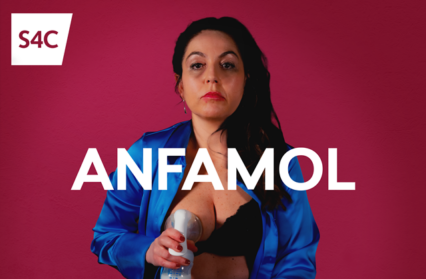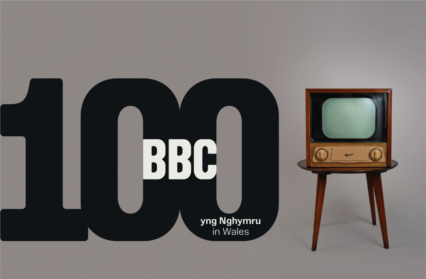Emma Schofield takes a look at S4C’s TV adaptation of Rhiannon Boyle’s hit stage play, Anfamol (Unmotherly) and reflects on what it has to say about our attitudes to pregnancy, parenthood and postnatal depression.
This autumn marks the arrival of Anfamol on our screens, the much-anticipated TV production of Rhiannon Boyle’s 2021 play. The stage play, produced by Theatr Genedlaethol Cymru, was the first full-length Welsh language production to be staged in the post-pandemic era and was widely acclaimed for its honesty about topics ranging from sex to IVF, and birth to postnatal depression. Delivered primarily as a monologue, the play centred on protagonist Ani (played by Bethan Ellis Owen), a forty-year-old woman who makes the decision to become a parent on her own by using a sperm donor. The TV adaptation brings these same topics to life, while still managing to capture the lightness and warmth of the original stage version, completely shattering the fourth wall as it does so.
Ellis Owen reprises her role as protagonist Ani for the S4C adaptation, oscillating easily between sarcastic quips to camera and moments of silent desperation as she tries to navigate the precarious route to becoming a solo parent. Ani’s desire to have a child of her own carries the first two episodes, before the drama moves on to exploring the effects of Llewellyn’s birth on Ani. Struggling with the lack of support, and having developed postnatal depression, Ani soon finds her health and career at jeopardy as she struggles to balance the demands of her working life with the exhaustion of motherhood.
It’s within that tension between work and parenthood that Ellis Owen’s portrayal of Ani is at its most powerful. Ani is a successful lawyer who loves her job, but the nagging feeling that something in her life remains unfulfilled still bothers her. When her Dad (played by Ellis Owen’s own Dad, Wynford Ellis Owen) makes a series of jokes at her expense during her sister’s wedding, Ani finds herself making the decision to use a sperm donor to get pregnant. Enter Lucas Aurelio who steps into the role of Estevez, the sperm donor Ani chooses, about whom she knows very little, but fantasises at length. The scenes in which Ani imagines herself with the overtly sexy Argentinian, Estevez, lend some lightness to the bleak reality of her struggle to get pregnant following her diagnosis of polycystic ovarian syndrome and numerous rounds of unsuccessful IVF. In Ani’s fantasies, Estevez speaks both Welsh and Spanish,
In fact, as enjoyable as the imagined scenes are, Anfamol shines brightest when it directs its spotlight onto those difficult issues. In one scene Ani decides to tell her antenatal group that she has stopped breastfeeding her baby due to her “flat nipples” and difficulty encouraging her baby to latch as a result. The announcement is met with stony silence and enough cliched remarks to strike a painful chord with anyone who has ever had to sit through similar debates and is an apt reminder of exactly why these topics are, all too often, still considered taboo. The same dynamic is in play in Ani’s desperation to conceal her postnatal depression; we see her deliberately answering questions from healthcare professionals and friends incorrectly to divert their attention from her struggle to bond with Llewellyn and her difficulty adapting to motherhood.
In the lead-up to the drama’s release, Ellis Owen spoke openly about her hope that the series would ole in the drama, said the series “give mums the freedom to know that it’s okay to be angry with their children or not to like them sometimes, and that doesn’t mean they don’t love them”. Her statement was echoed by Rhiannon Boyle, who has admitted previously that the original script was inspired by her own experiences of having two children within twenty-one months of each other and the difficulties she faced trying to adapt to her new role as a parent. Don’t let the serious content matter trick you into a false sense of security though, there’s still plenty here to add humour to Ani’s deep dive into motherhood. From seeing the reality behind a popular lifestyle blogger’s depiction of her family life, to watching her colleague Delyth lie to their misogynist boss Rhodri when she’s forced to leave work early to collect her baby from nursery, there’s plenty of wit to balance the seriousness which undercuts the drama.
Interestingly, the production surrounding Anfamol has put much of the sentiment from the drama into action through its creation. Ellis Owen gave birth to her third child last year, just before filming on the series began, and the shooting schedule took her needs as a new mum into consideration. Likewise, a conscious effort was made to ensure that as many women as possible were included in the production team for the series, in a bid to combat the male-dominated culture of an industry where women are, all too often, underrepresented on set. The cast itself also hinges on a range of on-point performances from its female cast members, including Olwen Medi as Ani’s own distracted, but well-meaning mother, alongside Lowri Gwynne and Mali Ann Rees as the show’s other mothers struggling in their own ways to find the means to juggle that inevitable change in lifestyle that parenthood brings.
Of course, not everything is perfect. At half an hour in length, the episodes are brief and time passes at a breakneck speed, which doesn’t always allow for as much development as Ani’s character often seems to demand. The pregnancy passes by in the break between episodes and the initial weeks following Llewellyn’s birth are skimmed over with similar speed. Notwithstanding the obvious challenges of packing so many different experiences into one series, it would have been great to see those moments properly unpacked and for Ellis Owen to have the space to really sink her teeth into each of those phases of Ani’s journey towards parenthood. As it is, things sometimes feel a little rushed.
Nevertheless, the script flows easily and the production has a natural feel that enables Anfamol to become one of those rare dramas that hits down the line and occasionally punches you where it hurts. At times heartfelt, at times sexy and almost always a little bit messy, it’s a drama which cuts to the core of why becoming a mother in 2023 is so challenging and it’s arrived not a moment too soon.
Anfamol is available to stream, in full, via BBC i-player.






